新视野第一册教案
新视野第一册 教案unit2
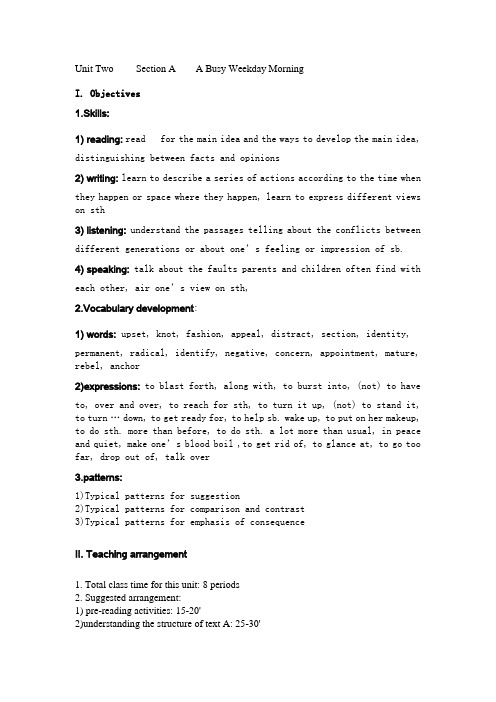
Unit Two Section A A Busy Weekday MorningI. Objectives1.Skills:1) reading: read for the main idea and the ways to develop the main idea,distinguishing between facts and opinions2) writing:learn to describe a series of actions according to the time whenthey happen or space where they happen, learn to express different views on sth3) listening: understand the passages telling about the conflicts between different generations or about one’s feeling or impression of sb. 4) speaking: talk about the faults parents and children often find with each other, air one’s view on sth,2.Vocabulary development:1) words: upset, knot, fashion, appeal, distract, section, identity,permanent, radical, identify, negative, concern, appointment, mature, rebel, anchor2)expressions: to blast forth, along with, to burst into, (not) to haveto, over and over, to reach for sth, to turn it up, (not) to stand it, to turn … down, to get ready for, to help sb. wake up, to put on her makeup, to do sth. more than before, to do sth. a lot more than usual, in peace and quiet, make one’s blood boil ,to get rid of, to glance at, to go too far, drop out of, talk over3.patterns:1)Typical patterns for suggestion2)Typical patterns for comparison and contrast3)Typical patterns for emphasis of consequenceII. Teaching arrangement1. Total class time for this unit: 8 periods2. Suggested arrangement:1) pre-reading activities: 15-20'2)understanding the structure of text A: 25-30'3) detailed study of the language: 45'4) writing skills: 15'5) text summary 10’6) exercises: 20'7) reading skills: 15'8) detailed study of of text B: 45'9) comprehensive exercises: 30'10) supplementary reading and vocabulary exercises: 45'11) listening&speaking : 90’III. Study of text A1. Pre-reading1. 1 Background information1) Green Waves(绿浪) is a fictional name for a musical group made up bythe writer for use in this story.2) French Lilac Blue(法国紫蓝)is a fictional name for eye-liner make-upmade up by the writer for use in this story.1. 1 Topic-related video1. 2 Topic-related discussion2. While-reading2. 1 Global reading2. 1. 1 Understanding the major details of the text1)Why did Mr. Finch shout at his daughter?He didn’t like the music his daughter listened to; he thought it wa s horrible stuff.2)Sandy seemed to enjoy the bathroom, but she didn’t stay long in it. Why?Because her mother or father would bang on the door to rush her.3)Throughout the story the parents and the daughter seem to have different views on things. What do the differences suggest to us?There is generation gap between them.2. 1. 2 Understanding the organization of the text1)Main idea of the text.The story “A Busy Weekday Morning” was centered upon the conflictsbetween Sandy and her parents over her favorite music, dresses, make-up and other minor things.2)Division of the text2. 2 Detail reading2. 2. 1 Words and phrases1)along with (L.2) 她与数千名难民一道逃离了伊拉克。
新视野第一册 教案unit

新视野大学英语第一册教案Unit One Section A Learning a Foreign LanguageI.Teaching Objectives1.Skills1)reading:reading for the main idea and the ways to develop the main idea, finding out word meanings2)writing: deduction, sequence of time and space order, comparison and contrast, how to presenta paragraph of cause and effect3)listening:understanding the passages about study, listening for the main idea and the important details, learning to take notes while listening4)speaking: talking about English study2.Vocabulary development:1)words: positive, virtual, access, commitment, discipline, minimum, reap, benefit, insight,forum, visual, barrier, hinder, critical, perspective, arise, explicit, comment, requirement, likely, commit, assimilate, essential2)expressions:be well worth the effort/time/ money, lose the desire to do sth, far from , tostay at the same level, to get access to sth., to keep up with the flow of…, to meet the minimum standards set by…, to cry with frustration, to feel like doing sth, to reap the benefits of…, to trade sth for sth, to teach sb the value of, to give sb insights into…, to keep sb’s mind open to sth., to bridge the gap between different cultures, to be open-minded about, in addition, reflect on / upon, to feel (un)comfortable doing sth, to gain insight from sth. / sb., speak up, think through, allow for, on sb’s part, remind…of3.Grammar:1)present participial phrases functioning as adverbials2)inverted sentence: not only3)conjunctions: now that, while, that4)prepositions: because of, unlikeII. Teaching arrangement1.Total class time for this unit: 8 periods2. Suggested arrangement:1) pre-reading activities: 15-20'2)understanding the structure of text A: 25-30'3) detailed study of the language: 45'4) writing skills: 15'5) text summary 10’6) exercises: 20'7) reading skills: 15'8) detailed study of of text B: 45'9)comprehensive exercises: 30'10)supplementary reading and vocabulary exercises: 45'11) listening&speaking: 90’III. Detailed Study of Text APre-reading1. Background informationOnline learninga form of distance education, refers to learning and other supportive resources that are available through a networked computer. With the development of the Internet, online learning often takes place on the Internet. In an online lesson, the computer displays material in response to a learner’s request. The computer asks the learner for more information and presents appropriate material based on the learner’s input.2. Understand the major details of the text1)What made the author’s English learning in junior middle school very successful?The kind and patient teacher and her positive method of praising all students often.2)What is basic to online English learning?Much time, commitment and discipline to keep up with the flow of the course.3)What interested the author most about English?He could communicate with many more people than before.3. Understand organization of the text1)Main idea of the text.Learning a foreign language was one of the most difficult yet most rewarding experiences of my life.2)Division of the textPart One Introduction (Para. 1)Learning a foreign language was one of the most difficult yet most rewardingexperiences of my lifePart Two The author’s 4 stages of language learning experiences (Paras. 2-7)(1)Junior middle school(2)Senior middle school(3)College(4)Online learningPart Three Conclusion (Para. 8) Learning a foreign language has been a most trying experience for me, but one that I wouldn’t trade for anything.Detail reading1. Words and phrases1)reward (L.1)在奥运会上的成功使他的努力得到了报偿。
《新视野大学英语》第一册_教案
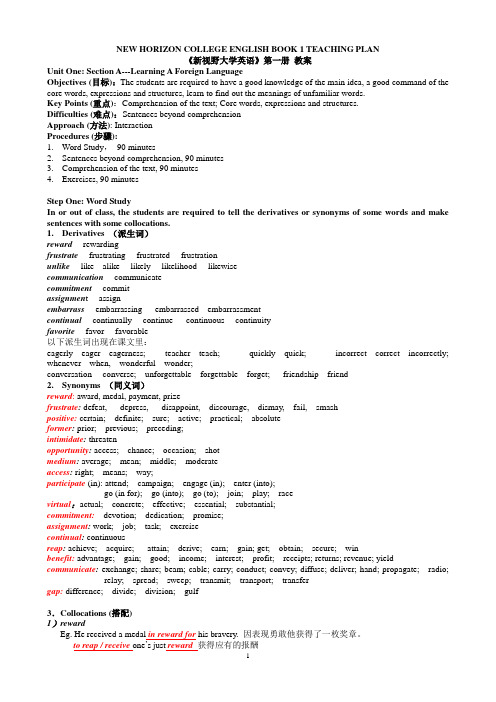
NEW HORIZON COLLEGE ENGLISH BOOK 1 TEACHING PLAN《新视野大学英语》第一册教案Unit One: Section A---Learning A Foreign LanguageObjectives (目标):The students are required to have a good knowledge of the main idea, a good command of the core words, expressions and structures, learn to find out the meanings of unfamiliar words.Key Points (重点):Comprehension of the text; Core words, expressions and structures.Difficulties (难点):Sentences beyond comprehensionApproach (方法): InteractionProcedures (步骤):1.Word Study,90 minutes2.Sentences beyond comprehension, 90 minutesprehension of the text, 90 minutes4.Exercises, 90 minutesStep One: Word StudyIn or out of class, the students are required to tell the derivatives or synonyms of some words and make sentences with some collocations.1.Derivatives (派生词)reward ---rewardingfrustrate ---frustrating ---frustrated ---frustrationunlike ---like---alike ---likely ---likelihood ---likewisecommunication ---communicatecommitment ---commitassignmen t ---assignembarrass ---embarrassing --- embarrassed---embarrassmentcontinual ---continually ---continue --- continuous ---continuityfavorite ---favor ---favorable以下派生词出现在课文里:eagerly---eager---eagerness; teacher---teach; quickly---quick; incorrect---correct---incorrectly; whenever---when, wonderful---wonder;conversation--- converse; unforgettable---forgettable---forget; friendship---friend2.Synonyms (同义词)reward: award, medal, payment, prizefrustrate: defeat, depress, disappoint, discourage, dismay, fail, smashpositive: certain; definite; sure; active; practical; absoluteformer: prior; previous; preceding;intimidate: threatenopportunity: access; chance; occasion; shotmedium: average; mean; middle; moderateaccess: right; means; way;participate (in): attend; campaign; engage (in); enter (into);go (in for); go (into); go (to); join; play; racevirtual:actual; concrete; effective; essential; substantial;commitment:devotion; dedication; promise;assignment: work; job; task; exercisecontinual: continuousreap: achieve; acquire; attain; derive; earn; gain; get; obtain; secure; winbenefit: advantage; gain; good; income; interest; profit; receipts; returns; revenue; yield communicate: exchange; share; beam; cable; carry; conduct; convey; diffuse; deliver; hand; propagate; radio;relay; spread; sweep; transmit; transport; transfergap:difference; divide; division; gulf3.Collocations (搭配)1)rewardEg. He received a medal in reward for his bravery. 因表现勇敢他获得了一枚奖章。
新视野英语第一册unit1教案
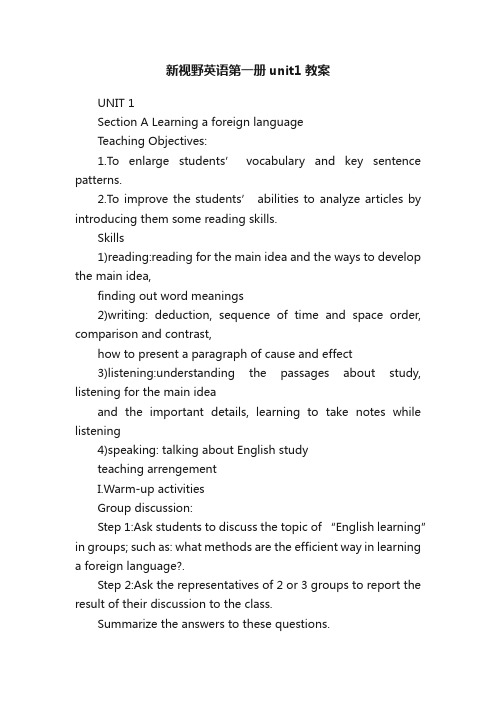
新视野英语第一册unit1教案UNIT 1Section A Learning a foreign languageTeaching Objectives:1.To enlarge students’ vocabulary and key sentence patterns.2.To improve the students’ abilities to analyze articles by introducing them some reading skills.Skills1)reading:reading for the main idea and the ways to develop the main idea,finding out word meanings2)writing: deduction, sequence of time and space order, comparison and contrast,how to present a paragraph of cause and effect3)listening:understanding the passages about study, listening for the main ideaand the important details, learning to take notes while listening4)speaking: talking about English studyteaching arrengementI.Warm-up activitiesGroup discussion:Step 1:Ask students to discuss the topic of “English learning” in groups; such as: what methods are the efficient way in learning a foreign language?.Step 2:Ask the representatives of 2 or 3 groups to report the result of their discussion to the class.Summarize the answers to these questions.II.Division of the textPart I: (Paragraph 1): the thesis of the passagePart II: (Paragraph 2-4): the author’s previous experience of learning English in the regular classroomPart III: (Paragraph 5-7): the author’s experience of online English learning and the benefits of learning English.Part Ⅳ: (Paragraph 8): the benefits the author got through a new language learning.II. Detailed study of the text1. reward: n. some money or some thing given to someone for his good doings. 报答报酬酬金e.g. He got a house as a reward for information about the lost child.The mayor gives him a medal as a reward for his bravery.rewarding: a. useful 有益的,有意义的.e.g. Reading is rewarding.Traveling broadly is a rewarding experience of his life.2. junior: a. some one of lower position 地位较低的,资历较浅的,3. senior: a. some one of higher position 地位较高的,资历较深的,e.g. a junior/senior officer, a junior/senior member of a party.4. positive: a.1)helpful; effectivee.g. Don’t just watch me; give me some positive advice --a positive attitude. 别只是看着我,给我提些积极的建议吧。
新视野大学英语第三版第一册unit4教案

一、教学目标1. 知识目标:(1)掌握本单元的核心词汇和短语;(2)理解文章的主旨大意和段落结构;(3)提高阅读理解能力。
2. 能力目标:(1)提高学生的口语表达能力;(2)培养学生的逻辑思维和批判性思维能力;(3)提高学生的写作能力。
3. 情感目标:(1)激发学生对英雄主义、勇敢和担当的思考;(2)培养学生具有积极向上的人生态度;(3)增强学生的团队协作精神和集体荣誉感。
二、教学重点与难点1. 教学重点:(1)核心词汇和短语的理解与运用;(2)文章主旨大意和段落结构的把握;(3)口语表达能力的提升。
2. 教学难点:(1)理解文章中的复杂句型和长难句;(2)分析文章的逻辑结构和论证方法;(3)培养学生的批判性思维能力。
三、教学方法与教学手段1. 教学方法:(1)启发式教学,引导学生主动思考;(2)小组讨论,培养学生的合作意识和团队精神;(3)情景模拟,提高学生的口语表达能力。
2. 教学手段:(1)多媒体课件,展示图片、视频等资料;(2)实物教具,如地图、图片等;(3)网络资源,如在线词典、阅读材料等。
四、教学过程(一)导入(5分钟)1. 教师简要介绍本单元主题:英雄主义;2. 学生分享自己心中的英雄,激发学生的兴趣。
(二)阅读理解(25分钟)1. 学生快速阅读文章,了解文章大意;2. 教师引导学生分析文章结构,总结段落大意;3. 学生细读文章,理解重点词汇和短语;4. 教师讲解长难句,帮助学生理解文章内容。
(三)口语表达(15分钟)1. 学生分组讨论,围绕文章主题展开讨论;2. 学生轮流发言,表达自己的观点;3. 教师点评,纠正学生的发音和语法错误。
(四)写作训练(15分钟)1. 教师讲解写作技巧,指导学生如何写一篇关于英雄主义的文章;2. 学生独立完成写作任务;3. 教师批改作文,给予学生反馈。
(五)课堂小结(5分钟)1. 教师总结本节课的重点内容;2. 学生分享自己的学习心得。
五、课后作业1. 复习本单元所学词汇和短语;2. 阅读相关文章,提高阅读理解能力;3. 撰写一篇关于英雄主义的文章,字数不少于300字。
B1U1-新视野大学英语第一册教案

U n i t1F r e s h S t a r tI.T e a c h i n g o b j e c t i v e sBy the end of the class, the students are supposed to:Know something basic information about college educationFurther understand the textApply the phrases and patternsMaster the paragraph writing skillI I.T e a c h i n g m e t h o d:task-based approachI I I.T i m e a l l o t m e n t:4 hoursI V.T e a c h i n g c o n t e n t:1.B a c k g r o u n d I n f o r m a t i o n1.1In the United States, the choices students have after high school include going to college, goingstraight to the workforce, attending a two-year community college before applying to a university.1.2Major criteria for university admission include:A student’s high school course of study;High school Grade Point Average (GPA);Participation in extracurricular activities;SAT or ACT exam scores, a written essay;A personal interview with a representative from the admissions office.1.3 Extracurricular activities students can participate in include Scholastic clubs, athletic teams, studentgovernment, and philanthropic (慈善) clubs. Through their voluntary participation in these kinds of activities, they can learn valuable life lessons, such as teamwork, leadership, or civic (公民) responsibility.1.4 Vera WangVera Ellen Want (王薇薇, 1949-) is a Chinese-American fashion designer. She was born and raised in New York City. While trained as a figure skater in high school, she eventually earned a degree in art history from Sarah Lawrence College in 1971. But a career in fashion was her dream. She worked as a senior fashion editor for V ogue (《时尚》杂志) for 15 years. In 1985, she left V ogue and joined Ralph Lauren as a design director for two years.In 1990, she opened her own design salon in New York, and featured her trademark bridal gowns. Wang has made wedding gowns for many well-known celebrities and public figures, such as Jennifer Lopez (珍妮佛·洛佩兹), and ChelseaClinton (切尔西·克林顿).2.L i s t e n i n gListen to an interview about tips for freshman students and do the exercise on Page 2.3.L a n g u a g e p o i n t s a n a l y s i s o f t h e t e x t1. pledge to do sth. 作保证,承诺中美政府承诺将加强合作与交流以确保两国关系的未来更加美好。
新视野英语教程读写教程第一册全册教案

Unit OneTeaching Procedure:Unit TwoTeaching Procedure:.Part I (Para.1-2):Kim has made a great progress in learningEnglish within only four years.Part II (Para.3-4): Kim reveals her intention in writing a book calledLooking for Trouble for the sake of the newarrivals to the U.S.Part III (Para.5-7): Kim’s experiences tell us that we ought t o bebrave and never be afraid of makingmistakes when learning a foreign language. III. Detailed study of Text A (20’)Sentences:1. “so+adj./adv.+that”是引导结果状语从句的常用结构,与“such (a/an) +adj.+n.+that”“so+adj.+a/an+n.+that”都表达了“如此······以致······”的意思。
She h as managed to become so fluent in English that she doesn’t even have a foreign accent!她能说一口流利的英语,而且不带外国口音!关系代词that/as与the same或such连用,在限制性定语从句中作主语或宾语This is the same hat as I was wearing a year ago.这就是一年前我戴的那顶帽子.He turned his attention to such pleasures that could be obtained in his work.他把注意力转向了他在工作中所能得到的种种乐趣。
新视野1教案新部编本精读[1]
![新视野1教案新部编本精读[1]](https://img.taocdn.com/s3/m/b54074e2caaedd3382c4d342.png)
教师学科教案[ 20 – 20 学年度第__学期]任教学科:_____________任教年级:_____________任教老师:_____________xx市实验学校NEW HORIZON COLLEGE ENGLISH BOOK 1 TEACHING PLAN《新视野大学英语》第一册教案Unit One: Section A---Learning A Foreign LanguageObjectives (目标):The students are required to have a good knowledge of the main idea, a good command of the core words, expressions and structures, learn to find out the meanings of unfamiliar words.Key Points (重点):Comprehension of the text; Core words, expressions and structures. Difficulties (难点):Sentences beyond comprehensionApproach (方法): InteractionProcedures (步骤):1. Word Study,90 minutes2. Sentences beyond comprehension, 90 minutes3. Comprehension of the text, 90 minutes4. Exercises, 90 minutes3.Collocations (搭配)1)rewardEg. He received a medal in reward for his bravery. 因表现勇敢他获得了一枚奖章。
to reap / receive one’s just reward 获得应有的报酬One reward of my job is meeting people. 我工作的报酬之一就是结识了很多人。
新视野大学英语第三版第一册Unit1教案

Unit 1, Book OneSection A: Toward a brighter future for all1. Teaching Objectives:To know the meaning and usage of some important words, phrases and patternsTo study Passage A and understand the main idea of the textTo understand the structure of the text and the devices for developing itTo talk about college education2.Time Allotment:Section A (3 periods):1st---2nd period: Pre-reading activities ( theme-related questions for warming up;)While-reading activities (cultural notes; useful words and expressions;difficult sentences)3rd period: While-reading activities (text structure; main ideas)Post-reading activities (comprehension questions; exercises) Section B(1period):4th periods: Practice of the reading skill (reading for the key idea in a sentence);T checks on Ss’ home reading by asking questions based on thepassage.T explains some difficult sentences3.Teaching Procedures:Pre-reading ActivitiesStep 1. GreetingsGreet the whole class warmly.Step 2. Lead-in and preparation for readingLet them talk to each other about the following questions:1. What is the ideal university like in your eyes?2. What are your expectations of your college life?3. What advice did your parents give you before you left for college?Step 3. Fast readingAsk the Students to read the passage as quickly as they can and then answer the questions on the screen. Let them get the main idea of each paragraph and make clear about the text structure.Text structure: ( structured writing ) The passage can be divided into 3 parts.Part1 (para.1-3) Opening part of the welcome speechPart 2 (para.4-7) Making the best of what you have.Challenging yourself.Facing new experiences.Opportunities and responsibilities.Part 3 (Para.8) Concluding remarks of the welcome speech.Purpose: Improve the students’ reading and writing ability and understand the general idea of each paragraph.Method:Read the text individually and talk in groups; Use task-based language teaching method, reading approach, communicative approach and total physical response method.Step 4. Preparation for details of the text on the screenStudents are required to look at the Words and Phrases on the screen and give a brief presentation in class.Words and Phrases:Purpose: Train the Students’ ability of understandi ng and using foreign language.Method:Talk in groups, Use task-based language teaching method, communicative approach and total physical response method.1. (Para.1)pledge to do sth. 作保证,许诺China and the United states pledge to boost cooperation and exchange to ensure a better future for China-US ties.中美政府许诺将增强合作与交流以确保两国关系的未来加倍美好。
BU新视野大学英语第一册教案
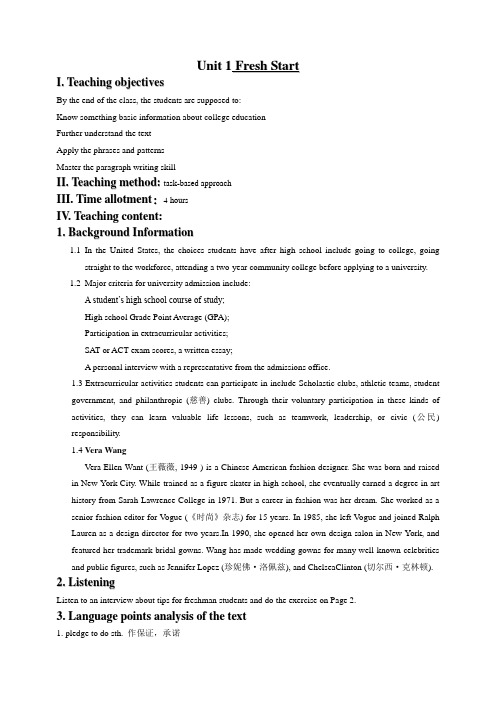
U n i t1F r e s h S t a r tI.T e a c h i n g o b j e c t i v e sBy the end of the class, the students are supposed to:Know something basic information about college educationFurther understand the textApply the phrases and patternsMaster the paragraph writing skillI I.T e a c h i n g m e t h o d:task-based approachI I I.T i m e a l l o t m e n t:4 hoursI V.T e a c h i n g c o n t e n t:1.B a c k g r o u n d I n f o r m a t i o n1.1In the United States, the choices students have after high school include going to college, goingstraight to the workforce, attending a two-year community college before applying to a university.1.2Major criteria for university admission include:A student’s high school course of study;High school Grade Point Average (GPA);Participation in extracurricular activities;SAT or ACT exam scores, a written essay;A personal interview with a representative from the admissions office.1.3 Extracurricular activities students can participate in include Scholastic clubs, athletic teams, studentgovernment, and philanthropic (慈善) clubs. Through their voluntary participation in these kinds of activities, they can learn valuable life lessons, such as teamwork, leadership, or civic (公民) responsibility.1.4 Vera WangVera Ellen Want (王薇薇, 1949-) is a Chinese-American fashion designer. She was born and raised in New York City. While trained as a figure skater in high school, she eventually earned a degree in art history from Sarah Lawrence College in 1971. But a career in fashion was her dream. She worked as a senior fashion editor for V ogue (《时尚》杂志) for 15 years. In 1985, she left V ogue and joined Ralph Lauren as a design director for two years.In 1990, she opened her own design salon in New York, and featured her trademark bridal gowns. Wang has made wedding gowns for many well-known celebrities and public figures, such as Jennifer Lopez (珍妮佛·洛佩兹), and ChelseaClinton (切尔西·克林顿).2.L i s t e n i n gListen to an interview about tips for freshman students and do the exercise on Page 2.3.L a n g u a g e p o i n t s a n a l y s i s o f t h e t e x t1. pledge to do sth. 作保证,承诺中美政府承诺将加强合作与交流以确保两国关系的未来更加美好。
新视野大学英语(第一册)Book 1 Unit 1 Section A Learning a Foreign language教案

1)Write a passage about your ownEnglishlearning experience with some of the language points in this passage.
2)Preview Section B
Step 5 Assignment
5)to stay at the same level forever
6)to get access to the necessary equipment
7)to keep up with the flow of the course
8)to meet the minimum standards set by the course
acquisition n. ( CN)获得或购得之物;(UN)获得
8.awful
9.instruct vt.
1.)指示,命令,吩咐=order
2.)教授;训练;指导[(+in)] =teach
3.)通知,告知
10. anxious adj.
1.)焦虑的,挂念的[(+about/at/for)]
2.)令人焦虑的
9)to cry with frustration
10)to feel like giving up
11)to reap the benefits of hard work
12)not to trade sth for anything
13)to teach me the value of hard work
B.by the age of eight
C.before they are five
新视野一unit1教案
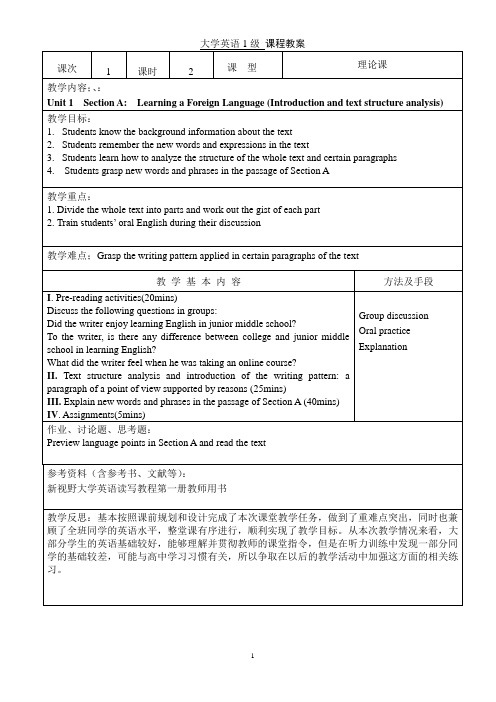
Session 1 (90mins):Section A: Learning a Foreign LanguageI. Pre-reading activities (20mins)Step 1Questions for discussion:1. Did the writer enjoy learning English in junior middle school?2. To the writer, is there any difference between college and junior middle school in learning English?3. What did the writer feel when he was taking an online course?Step 2Pre-reading listening:First listening: Listen to the passageSecond listening: Listen to the passage again and answer the following questions according to what you hear.1. Why the writer’s learning attitude changed after entering senior middle school?2. What did the writer feel when he was taking an online course?3.Is the writer’s experience in learning a foreign langu age meaningful? Why?II. Text structure analysis and introduction of the writing pattern: a paragraph of a point of view supported by reasons. (25mins)Step 1:Text structure analysisDivide the text into parts and work out the general idea of each part. The passage is a first person narrative about the experiences of learning a foreign language. It is made up of three parts.Part One (Para 1): (This part makes the topic of the reading passage clear.) Learning a foreign language was one of the most rewarding experiences the writer has had.Part Two (Para 2-7): (This is the major part of the reading passage.) In this part, the writer describes his learning experiences in four different learning stages (i.e. junior middle school, senior middle school, college, and after graduating).Para.2:The writer’s experiences with learning a foreign language began in junior middle school.Para.3:The writer’s experience in senior middle school was different from before.Para.4:The writer’s experiences in college.Para.5: When the writer was offered an opportunity to study English through an online course his learning situation was changed.Para.6:Online learning is no easier than regular classroom study; it requires a lot of time, commitment and discipline to keep up with the flow of the course.Para.7:The writer practiced all the time. Though he was still making many mistakes, he had reaped the benefits of all of his hard work.Part Three (Para 8): (It summarizes the writer’s experiences in learning a foreign la nguage.) Through the learning process, the writer learned the value of hard work, gained insights into another culture, and opened his mind to new ideas. Communicating in English helped the writer form new friendships and bridge the gap between cultures.III. Explain new words and phrases in the passage of Section A (40mins)1. rewardvt. give sth. in return for good and valuable doings 奖赏;回报He always believed that the company would reward him for his efforts. 他总是相信公司会因他付出的努力而奖赏他。
新视野大学第一册教案

Unit 1: Section A Learning a Foreign LanguageIII. Expressions & PatternsA. Expressions1.很值得去努力to be well worth the effort (L. 3)生活中并非一切都值得我们去冒险。
Not everything in life is well worth our risk.2.在班里名列前茅to be at the top of the class (L. 7)在社交方面所有的良策之中诚信应列在首位。
On the list of good policies in social contact, honesty should be at the top.3. 失去说英语的欲望to lose my desire / eagerness to say anything in English (L.14)由于她的不诚实,我失去了与她建立进一步友谊的欲望。
As a result of her dishonesty, I lost my desire to form further friendship with her.4.远不尽人意to be far from perfect (L. 19)尽管我们的环境还远不尽人意,我们并没有失去使其改善的意愿。
Although our environment is still far from perfect, we haven’t lost the desire to change it for the better.5.永远停滞不前to stay at the same level forever (L. 26)有时,我们的英语学习似乎总停滞不前,但事实上并不一定如此。
Sometimes our English learning seems to stay at the same level forever, but, in fact, this is not necessarily the case.6. 接触到必要的设备to get access to the necessary equipment (L. 30)通过网上学习我们接触到许多新思维模式。
新视野大学英语第一册教案unit_1
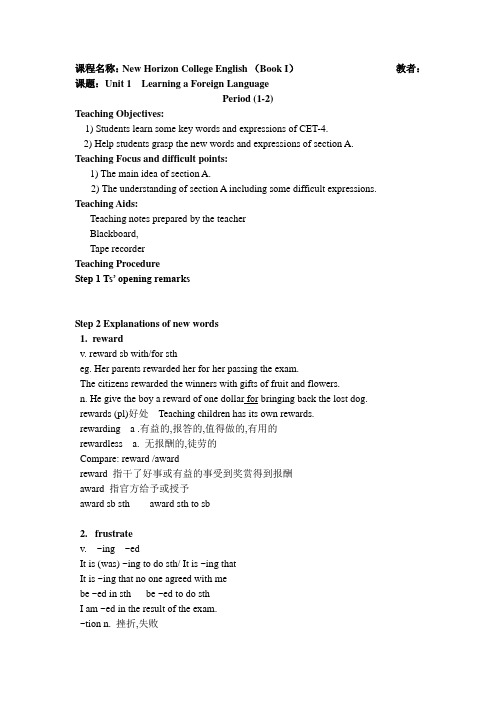
课程名称:New Horizon College English (Book I)教者:课题:Unit 1 Learning a Foreign LanguagePeriod (1-2)Teaching Objectives:1) Students learn some key words and expressions of CET-4.2) Help students grasp the new words and expressions of section A.Teaching Focus and difficult points:1) The main idea of section A.2) The understanding of section A including some difficult expressions. Teaching Aids:Teaching notes prepared by the teacherBlackboard,Tape recorderTeaching ProcedureStep 1 Ts’ opening remarksStep 2 Explanations of new words1.rewardv. reward sb with/for stheg. Her parents rewarded her for her passing the exam.The citizens rewarded the winners with gifts of fruit and flowers.n. He give the boy a reward of one dollar for bringing back the lost dog.rewards (pl)好处Teaching children has its own rewards.rewarding a .有益的,报答的,值得做的,有用的rewardless a. 无报酬的,徒劳的Compare: reward /awardreward 指干了好事或有益的事受到奖赏得到报酬award 指官方给予或授予award sb sth award sth to sb2.frustratev. ~ing ~edIt is (was) ~ing to do sth/ It is ~ing thatIt is ~ing that no one agreed with mebe ~ed in sth be ~ed to do sthI am ~ed in the result of the exam.~tion n. 挫折,失败Compare: beat , defeat, discourage3.positivea. Do not just watch me; give me some ~advice.(effective, helpful)We still do not have a ~ answer as to how he died.(definite)Be ~ of /that : Are you ~ that he is the man you saw yesterday?Are you ~ of her honesty?近: definite 反: negativemunicatev. ~ sth to 向…传达~ with 和…沟通(相连)We should learn to ~ with others.The officer ~d his order to the soldiers by radio.She tried to ~ her thoughts to her children.~tion n. ~tive a. 愿意说的~nicable a.可传达的5.mediumn. Air is a ~ of sound.Newspaper is a prime ~ of communication.The boy is of ~ height for his ageCompare: ~ / middle ~ 指按照具体或抽象标准衡量中等或适中的Middle 指距离.要求.标准.方位等的中间A man was lying in the middle of the road.I want to buy a ~-sized coat.6. accessn. have ( get, gain ) ~ to sth ( sb )The only ~ to that building was guarded by the soldiers.He was not allowed ~ to his brother who was in prison.It is difficult to gain ~ to him.Students must have ~ to good books.accessible ( to ) a. 容易得到的,可以使用的accessibility ( to ) 易接近,易取得Compare: assess 评定(估,价),核定,判断, asset 优点,天赋,(复数)资产excess 超过,超量,过剩mitment]n. make/take/undertake a ~ to do sthHe felt he did not have to make such a ~ to Mary.I do not want to get married because I do not want any ~s.Commit v. commit a crime /mistake commit suicidecommit oneself to 承担义务,承诺admit ,emit, limit, omit, permit, submit, transmit8. minimumn. The ~ passing mark is 40 out of 100.The temperature reached a ~ at midnight.~ ( pl )- minimums or minima (反) maximummini- 微型的,小的miniskirt minibusminimal a. 最小的,最低限度的minimize v. 使减少到最低限度9.embarrassvt. It ~ed her that her husband was drunk at the dinner.~ing a. ~ed a. ~ingly adv. ~ment n. 局促不安,难堪be/feel ~ed sth is ~ing ~ sb with sth/by doing sthShe was ~ed when they asked her age.I do not like making speeches in public; It is so ~ing.Compare:~ing/~ed/awkward~ing (某事,某种情理)使人尴尬~ed (某人)尴尬的awkward a.尴尬的,棘手的,可修饰人,也可修饰物.He was in an awkward situation.10. benefitn. He told me that he got no personal ~ from the businessRain will ~ the crops.v. (sth.) ~ sb ; ~ sb ; ~ (a lot/greatly) from/by (sth./doing sth.)for the ~ of =for the interest / good of ; be of ~ to sb. /sth. 对….有裨益I travel for the ~ of my health.The book was not of much ~ to me.beneficial a.Compare: ~ ; good ; profit11.be well worth sth./doing sth.A bird in hand is worth two in bush.The picture is worth ten thousand dollars.The film is well worth seeing.12.not only….but alsoShe is not only a good wife , but she is also a good mother.Not only did we enjoy the film, but we also had a wonderful time.另外: Only in this way can you hope to finish the work at the end of this month.当它连接两个并列成分做主语是,谓语的单复数采用就近原则,由but also 后的名词决定,英语中还有either….or… ; neither….nor….Not only she but also I like the dress.13. reap the benefits ofHe has reaped the benefits of a first-class education.I hope you will reap the benefits of investing in it.14.reach out ( to )We must ~ to those in need.reach out for You must reach out for any opportunity that comes your way.reach for He reached for the phone and dialed the number.15. rade…for/with:歌迷用五张光盘换到一张演唱会的入场券。
新视野大学英语第一册unit1

7.Writing practice (15minutes)
作业
Assign homework:
Recite the appointed paragraph
Translation and after-class reading
辅助手段
使用多媒体演示文稿,使用电脑磁带复读机及语音教室训练听力,在网上进行教师与学生的教学互动
e.g He felt that he got much benefit from conversations with foreigners.
12.Trade:
1).Trade…for…: exchange …for…
e.g He decided to trade his cart for a truck.
Do the exercises on pages 6 to 10 including:
1.Vocabulary
2.Structure
3.Translation
Enrichment reading:
Elicit questions from the students, practice fast reading skills, focus on difficult sentences and cultural notes and improves students’ self-learning abilities.
Step 2:Ask the representatives of 2 or 3 groups to report the result of their discussion to the class.
新视野第一册教案unit (2)

新视野第一册教案unit (2)新视线大学英语第一册教课设计Unit One Section A Learning a Foreign LanguageI.Teaching Objectives1)reading: reading for the main idea and the ways to develop the main idea, finding out word meanings2)writing:deduction, sequence of time and space order, comparison and contrast, how to presenta paragraph of cause and effect3)listening: understanding the passages about study, listening for the main idea and the important details, learning to take notes while listening4)speaking:talking about English study2.Vocabulary development:1)words: positive, virtual, access, commitment, discipline, minimum, reap, benefit, insight,forum, visual, barrier, hinder, critical, perspective, arise, explicit, comment, requirement,likely, commit, assimilate, essential2)expressions: be well worth the effort/time/ money, lose the desire to do sth, far from , tostay at the same level, to get access to sth., to keep up with the flow of , to meet the minimum standards set by , to cry with frustration, to feel like doing sth, to reap the benefitsof , to trade sth for sth, to teach sb the value of, to give sb insights into , to keep sb ’s mind open to sth., to bridge the gap between different cultures, to be open-minded about, inaddition, reflect on / upon, to feel (un)comfortable doing sth, to gain insight from sth. / sb., speak up, think through, allow for, on sb ’s part, remind of3.Grammar:1)present participial phrases functioning as adverbials2)inverted sentence: not only3)conjunctions: now that, while, that4)prepositions: because of, unlikeII. Teaching arrangement1.Total class time for this unit: 8 periods新视野第一册教案unit (2)2. Suggested arrangement:1) pre-reading activities: 15-20'2)understanding the structure of text A: 25-30'3)detailed study of the language: 45'4)writing skills: 15'5) text summary 10’6)exercises: 20'7)reading skills: 15'8)detailed study of of text B: 45'9)comprehensive exercises: 30'10)supplementary reading and vocabulary exercises: 45'11) listening&speaking:90’III. Detailed Study of Text APre-reading1. Background informationOnline learninga form of distance education, refers to learning and other supportive resources that are available through anetworked computer. With the development of the Internet, online learning often takes place on the Internet. In anonline lesson, the computer displays material in response to a learner’ s request. The computer asks the learner for more information and presents appropriate material based on the learner ’ s input.2. Understand the major details of the text1) What made the author’ s English learning in junior middle school very successful?The kind and patient teacher and her positive method of praising all students often.2) What is basic to online English learning?Much time, commitment and discipline to keep up with the flow of the course.3) What interested the author most about English?He could communicate with many more people than before.3.Understand organization of the text1 )Main idea of the text.Learning a foreign language was one of the most difficult yet most rewarding experiences of my life.2)Division of the textPart One Introduction (Para. 1)Learning a foreign language was one of the most difficult yet mostrewarding experiences of my lifePart Two The author’s4stages of language learning experiences (Paras. 2-7)(1)Junior middle school (2)Senior middle school ( 3) College(4)Online learningPart Three Conclusion (Para. 8)Learning a foreign language has been a most trying experiencefor me, but one that I wouldn’ t trade for anything.Detail reading1. Words and phrases1) reward (L.1)在奥运会上的成功使他的努力获取了报偿。
新视野英语教程读写教程第一册全册教案
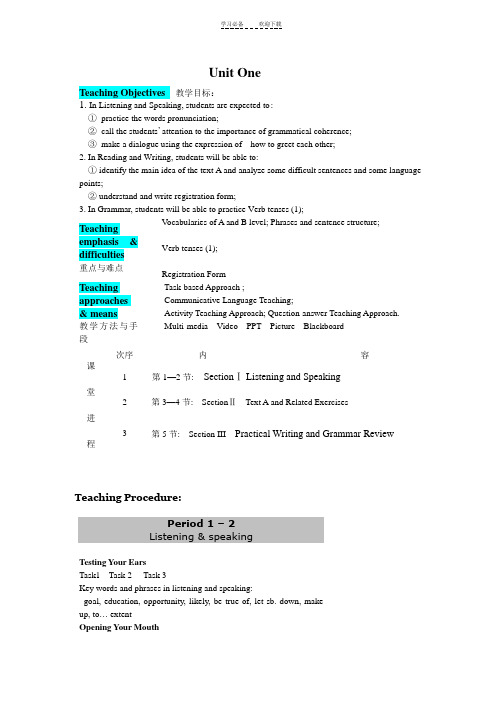
Unit OneTeaching Objectives 教学目标:1. In Listening and Speaking, students are expected to :① practice the words pronunciation;② call the students ’ attention to the importance of grammatical coherence;③ make a dialogue using the expression of how to greet each other;2. In Reading and Writing, students will be able to:① identify the main idea of the text A and analyze some difficult sentences and some language points;② understand and write registration form;3. In Grammar, students will be able to practice Verb tenses (1); Teaching emphasis & difficulties 重点与难点 1. V ocabularies of A and B level; Phrases and sentence structure;2. Verb tenses (1);3. Registration FormTeaching approaches & means 教学方法与手段Task-based Approach ;Communicative Language Teaching;Activity Teaching Approach; Question-answer Teaching Approach. Multi-media Video PPT Picture Blackboard课堂进程次序 内 容1 第1—2节: Section Ⅰ Listening and Speaking2 第3—4节: Section Ⅱ Text A and Related Exercises3 第5节: Section III Practical Writing and Grammar ReviewTeaching Procedure:Period 1 – 2Listening & speakingTesting Your EarsTask1---Task 2----Task 3Key words and phrases in listening and speaking:goal, education, opportunity, likely, be true of, let sb. down, makeup, to … extentOpening Your MouthExpressions for showing likes and dislikes:e.g.My name is… ./ It’s a pleasure to meet you. /I’d like you to meet … / I’d like you to know …/I’m a new student in … college. / What’s your firstname? / What do you do?/Where are you from? /It’sbeen nice talking to you. / Nice talking to you. /introduce … toTalking Together:Task 1—Task 2—Task 3 aims to build the students’abilities in listening and speaking.Homework: P7.Task 4Period 3 – 4Reading Through: Text A –How to be Cool at CollegeLeading-In (10’)(PPT导入)Ask some Ss to give an oral presentation about introduction; tellingthe reasons why they want to be college Ss ,the purpose for enteringcollege and the differences between middle school and college.Skimming and Scanning ( 5 – 8’ )Main Idea of Text A:Going to college for the first time is an exciting moment in your life. At college, everything is new and you will be on yourself. As a college student, you should use your time wisely to learn as much as possible and work hard to get the very best out of the opportunities, enjoy meeting new people and prepare you for a bright future.Read the Text A fast and then tell the main idea of each part. Structure of Text APart I (Para. 1): Going to college is lucky. So you should set goalsfor yourself.Part II (Para.2-4): The teacher gives some suggestions and adviceson education at college.Part III (Para.5): As a college student, you should be determined tolearn more.III. Detailed study of Text A (20’) Sentences:1.How to Be Cool at College(p)How to make yourself very good and impressive to others at collegecool: a. very good; impressive; fashionable; trendy (spoken) 绝妙的You look really ~ in that new dress. 你穿那件衣服很帅。
新视野大学英语第三版第一册Unit 1教案

Unit 1, Book OneSection A: Toward a brighter future for all1. Teaching Objectives:To know the meaning and usage of some important words, phrases and patternsTo study Passage A and understand the main idea of the textTo understand the structure of the text and the devices for developing itTo talk about college education2.Time Allotment:Section A (3 periods):1st---2nd period: Pre-reading activities ( theme-related questions for warming up;)While-reading activities (cultural notes; useful words and expressions;difficult sentences)3rd period: While-reading activities (text structure; main ideas)Post-reading activities (comprehension questions; exercises)Section B(1period):4th periods: Practice of the reading skill (reading for the key idea in a sentence);T checks on Ss’ home reading by asking questions based on the passage.T explains some difficult sentences3.Teaching Procedures:Pre-reading ActivitiesStep 1. GreetingsGreet the whole class warmly.Step 2. Lead-in and preparation for readingLet them talk to each other about the following questions:1. What is the ideal university like in your eyes?2. What are your expectations of your college life?3. What advice did your parents give you before you left for college?Step 3. Fast readingAsk the Students to read the passage as quickly as they can and then answer the questions on the screen. Let them get the main idea of each paragraph and make clear about the text structure.Text structure: ( structured writing ) The passage can be divided into 3 parts.Part1 (para.1-3) Opening part of the welcome speechPart 2 (para.4-7) Making the best of what you have.Challenging yourself.Facing new experiences.Opportunities and responsibilities.Part 3 (Para.8) Concluding remarks of the welcome speech.Purpose: Improve the students’ reading and writing ability and understand the general idea of each paragraph.Method:Read the text individually and talk in groups; Use task-based language teaching method, reading approach, communicative approach and total physical response method.Step 4. Preparation for details of the text on the screenStudents are required to look at the Words and Phrases on the screen and give a brief presentation in class.Words and Phrases:Purpose: Train the Students’ ability of understandi ng and using foreign language.Method:Talk in groups, Use task-based language teaching method, communicative approach and total physical response method.1. (Para.1)pledge to do sth. 作保证,承诺China and the United states pledge to boost cooperation and exchange to ensure a better future for China-US ties.中美政府承诺将加强合作与交流以确保两国关系的未来更加美好。
- 1、下载文档前请自行甄别文档内容的完整性,平台不提供额外的编辑、内容补充、找答案等附加服务。
- 2、"仅部分预览"的文档,不可在线预览部分如存在完整性等问题,可反馈申请退款(可完整预览的文档不适用该条件!)。
- 3、如文档侵犯您的权益,请联系客服反馈,我们会尽快为您处理(人工客服工作时间:9:00-18:30)。
e.g.I saw a couple of children playing in the garden.
7.Line 30:Access: n. Way of entering; right of using, reaching, or entering
2
2010年12月13、14、15日
10级本科生
Unit 9-Section A: Looking to the 21stCentury
2
2010年12月16、17日
10级本科生
Unit 9-Exercises (Vocabulary, Translation, Story Summary in Section A), Section B: Trends for the 21stCentury
2
2010年11月18、19日
10级本科生
Unit 5- Listening & Speaking
2
2010年11月22、23、24日
10级本科生
Unit 6-Section A: The Widow
2
2010年11月25、26日
10级本科生
Unit 6-Exercises (Vocabulary, Translation, Story Summary in Section A),Section B: The Trashman & Test Six(自主测试)
2.Line 6: (a.)Positive : effective; helpful
e.g.Don’t just watch me; give me some positive advice.
3.Line 7:I was atthe topof my class for two years. (Para.2)
2
2010年11月29、30日12月1日
10级本科生
Unit 7-Section A: Face to Face with Guns
2
2010年12月2、3日
10级本科生
Unit 7-Exercises (Vocabulary, Translation, Story Summary in Section A), Section B: Should I Have a Gun?
Step 2: Language points and Difficult Sentences
1.Line 2:Although at times, learning a language was frustrating, it waswell worth the effort.( Para.1)
Meaning: Although sometimes learning a language is disappointing, it wasrewarding enough to spend the time and effort on it.
Note:with ”not only” or “only” placed at the beginning of a sentence, the sentence order should be inverted as you find it in the reading passage.
e.g.Only in this way can you hope to finish the work at the end of this month.
2
2010年11月8、9、10日
10级本科生
Unit 4- Listening & Speaking
2
2010年11月11、12日
10级本科生
Unit 5-Section A: TheBattleAgainst AIDS
2
2010年11月15、16、17日
10级本科生
Unit 5-Exercises (Vocabulary, Translation, Story Summary in Section A)&Section B: The Last Dive at the Olympics
2
2010年10月9、10日
10级本科生
Unit 1- Listening & Speaking
2
2010年10月11、12、13日
10级本科生
Unit 2-Section A: A Busy Weekday Morning
2
2010年10月14、15日
10级本科生
Unit 2-Exercises (Vocabulary, Translation, Story Summary in Section A)&Section B: Parent Talk
教案
《新视野大学英语1》
2010-2011学年第1学期
教研室
教师
教案目录
授课时间
授课对象
内容
学时
页数
2010年9月20、21、22日
10级本科生
Unit 1-Section A: Learning a Foreign Language
2
2010年9月23、24日
10级本科生
Unit 1-Exercises (Vocabulary, Translation, Story Summary in Section A)&Section B: Keys to Successful Online Learning
教学要求
清楚文章的结构,掌握语言点,简要概括整篇文章
教
材
分
析
重点
本篇文章的结构以及cause-effect的写作方式
解决办法
阅读并了解文章的结构同时结合讨论
难点
本篇文章涉及到的四级词汇和短语及其用法以及cause-effect的写作方式
解决办法
提问、翻译的同时结合讨论
教学方法
分组讨论、翻译
教学手段(图表、投影、幻灯、录像、CAI及多媒体等)
课堂设计
主要内容
拟用时间
表达方式
Step 1: Warm-up
30m
提问和小组讨论
Step 2: Language points and Difficult Sentences
30m
举例和提问
Step 3:Comprehension of the Text
15m
提问
Step 4: Text Structure Analysis
e.g.The only access to that building was guarded by the soldier
8.Line 33:Commitment: n. A promise to follow certain beliefs or course of actions
e.g.He felt he didn’t have to make such a commitment to Mary.
2
课程名称
大学英语
教材名称
新视野大学英语
授课时间
2004年9月20,21,22日
授课对象
04级本科生
教学内容提要
Unit 1-Section A: Learning a Foreign LanguageFra bibliotek计划学时2
教学目的
让学生了解在语言学习的过程中使用电脑的优缺点以及如何成为成功的语言学习者并掌握相关的词汇和短语及其用法
10m
举例和提问
Step 5: Summarize the passage orally
10m
提问
Step 6: Homework
5m
布置作业
教学过程
Step 1: Warm-up
Please work in groups to discuss your experiences of English learning with your group members. And then I will ask some students to give us a brief report about one of your group members’ experiences of English learning. If you have nothing to say, I will give you a list of your talking. 1) when did you start learning English? 2) how did you feel about learning English at different stages? 3) what is your impression about your English teachers?
2
2010年12月20、21、22日
10级本科生
Unit 10-Section A: Being Honest and Open Exercises
2
2010年12月23、24日
10级本科生
Unit 10-Exercises (Vocabulary, Translation, Story Summary in Section A), Section B: Web Set Resources: The Best Aid for Cheating?
Meaning: I wasone of the excellent studentsin my class for two years.
4.Line 13:Not only did I lose my joy in answering questions, but also I totally lost my desire to say anything at all in English. ( Para.3 )
